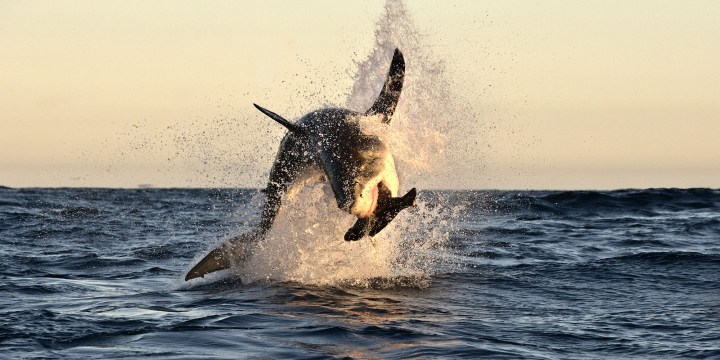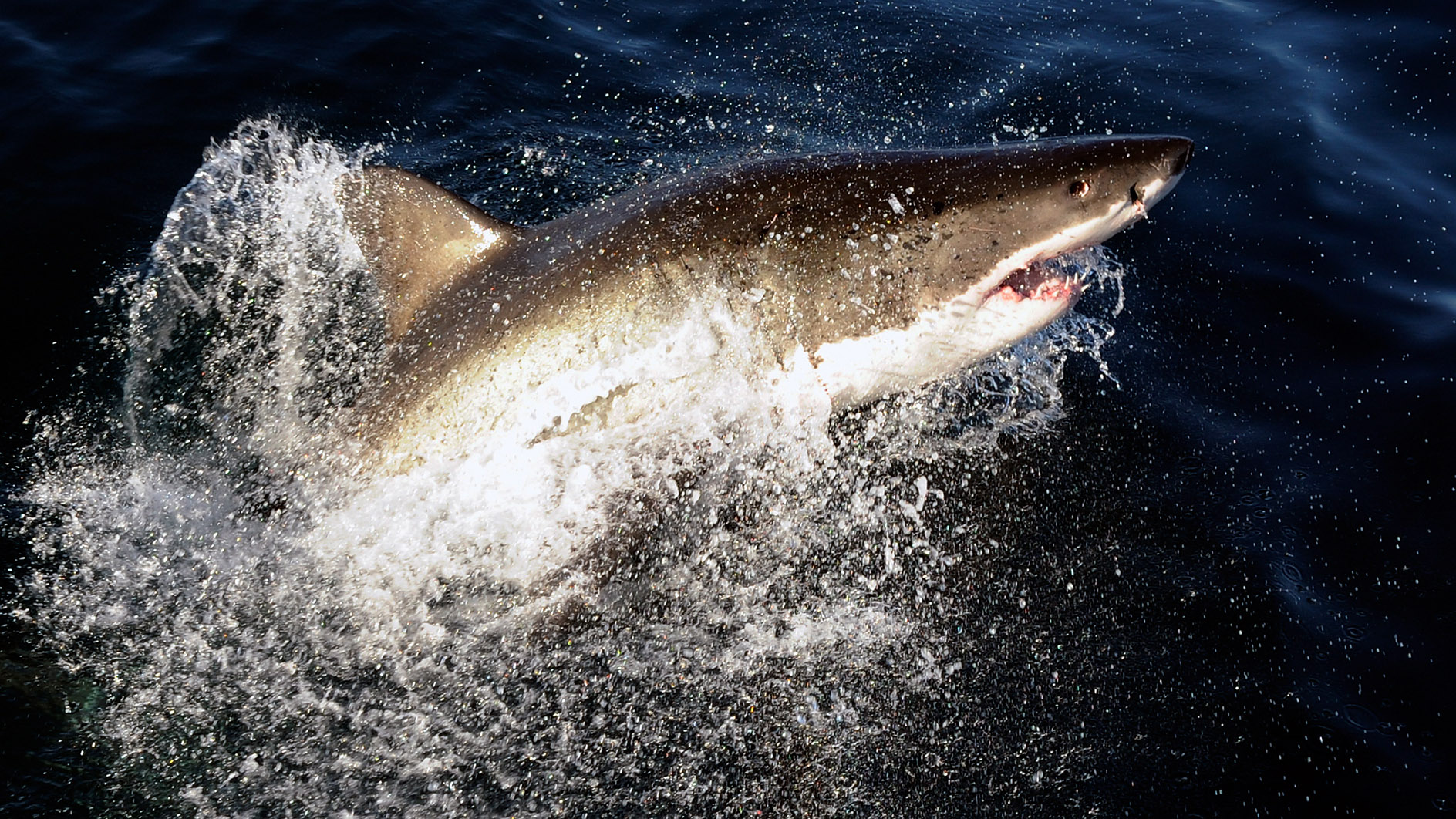SHARKS SPOTTED
Great whites may finally be creeping back into False Bay after lengthy absence

Great white sharks, mysteriously absent from False Bay for years, have in the past few weeks been seen there on six occasions. It may be cause for cautious celebration and a warning to bathers.
In 2011 great white sightings in False Bay hit an all-time high, with over 300 sightings by Shark Spotters. By 2020 that had crashed to zero and stayed that way for the following three years.
It was much the same along the south and east coast and did considerable damage to the shark cage diving industry. For tourists, not seeing a great white was like failing to encounter a lion in Kruger Park.
Debates about their disappearance raged. Was it the appearance of two shark-catching orcas Port and Starboard? Was it demersal long-line fishing boats catching smaller sharks that are central to great white diets? Were they simply moving to other areas (great whites swim great distances)? Were they being killed on the KZN anti-shark drumlines?
Late last month and then in early December, Shark Spotters logged four sightings, two by spotters at Muizenberg, one by a spearfisher at Smitswinkel Bay and another by “an experienced user” off Roman Rock. Sarah Waries of Shark Spotters added that someone fishing off Macassar had hooked, then released a great white.

A great white shark (Carcharodon carcharias) jumps out the water next to a boat in the Indian Ocean, Gansbaai, South Africa, 19 June 2010. (Photo: EPA / Francl Robichon)
Dave Hurwitz of the Simon’s Town Boat Company based in Simon’s Town said he had reports of a great white at Miller’s Point. He added that it wasn’t the traditional season for great whites which is February to September when the seals pup.
“At this stage,” Spotters said in an advisory, “it is unclear whether these are sporadic, one-off sightings, or if this may signal the return of white sharks to False Bay in more numbers. In either event, we would like to remind water users to exercise caution whenever they enter the ocean and be aware that there may be more white shark activity in the bay than we have experienced in recent years.”
“There’s no way to tell if the great whites are back or just cruising through,” said Wares. “We put out an alert because people have become complacent in the absence of whites — spotters haven’t seen them for a long time.
“I don’t think they left because of an absence of food stocks. There’s been no drop in seal numbers or yellow fish or katonkel and smaller shark species. Actually, we’ve had good fish activity in the past few years and there has been no demersal longline fishing in False Bay. So I don’t think it’s food source.
“I do think orcas had a significant impact. When they arrived we started to see a reduction in white sharks so there seems to be a correlation, but of course, correlation doesn’t mean causation. There were probably a number of factors involved — it’s difficult to study such a highly migratory species. Whites travel between Mozambique and Angola. Locally tagged sharks have been logged off Mauritius and Reunion. Sharks move massive distances.
“Our stats showed that whites declined when the orcas appeared once or twice, then when the orcas came repeatedly the whites disappeared completely. They had no avoidance tactics against orca predation. Seals will swim behind sharks to ‘disappear’, but when white sharks did that it didn’t work because orcas work as a team and they’d come from the side. But thankfully great whites have come back.”
In False Bay the main breeding season for Cape fur seals is in full swing with massive bulls coming ashore on Seal Island and collecting harems of about 20 females. At this time the seal population in the bay can grow to over 74,000 seals, including up to 20,000 pups.
Hurwitz said the return of the whites could pose a real problem for the seals who, for three generations, may have lost the skills of avoiding them. It’s a message migrating great whites may have picked up. DM



















 Become an Insider
Become an Insider
Why on earth would it be a “cause for celebration”? The last thing we need is great whites swimming around our beaches. Call in Port and Starboard, I say. They have been doing their thing up in Plett and are looking for more work.
Mmmmmm, you clearly don’t understand the role of how an ecosystem works and why the sharks were here in the first place. Every health ecosystem needs apex predators to function and the sharks fill that role around False Bay. Humans are alien to that ecosystem and should treat it with the respect it deserves.
Oh boy here we go again. The “they were here first we are intruders” mentality.
JDW2023 didn’t say we are intruders. He/she said we are alien to the (marine) ecosystem. Or are you possibly a fish, or even a seal?
Silly comment. They’re majestic – and endangered – creatures. They’ve been a feature of South Africa’s coastline for years. It’s our fault for venturing into their domain. I’ll put it another way: would you encourage the killing of lions or other predators in the Kruger Park for the sake of human tourism?
But they are not in the Kruger!! They are swimming off our beaches.
Totally agree with you, when they migrate away from us that was their own choice. The article clearly says we don’t understand their patterns and it’s most likely due to predation from Orca’s. This is not human interference.
I’d far rather they were somewhere else. I’m not saying hurt them or chase them or anything ecologically unfriendly. But I’d rather they were somewhere else. I love swimming in the sea, I love nature, I’m a conservationist, but I can’t enjoy swimming in the sea when my life’s in danger so I’d rather they were somewhere else. I’m on team Orca. I’m also on the side of humans not being killed, and the ones who suffer are the ecologically friendly – bathers, open water swimmers, snorkellers etc. The ecologically unfriendly are far less affected.
I can’t wait for them to move off again. For the rest of you talking about ecosystems, what do you do when a deadly snake or baboon comes into your house? Of course you chase it away, who wants their child or pet getting killed? I do the same. But I’d ask you to be consistent. Bring on the Orcas
How do you hook and then release a great white pray?
Err, it’s called nature? They’re endangered. They need monitoring, study & protection. Probably from ignorant folks that don’t understand.. see https://www.nationalgeographic.com/
There’s no pill for stupid..
Perhaps not but you should keep looking. By calling someone stupid I think you’ve asked for this🤣